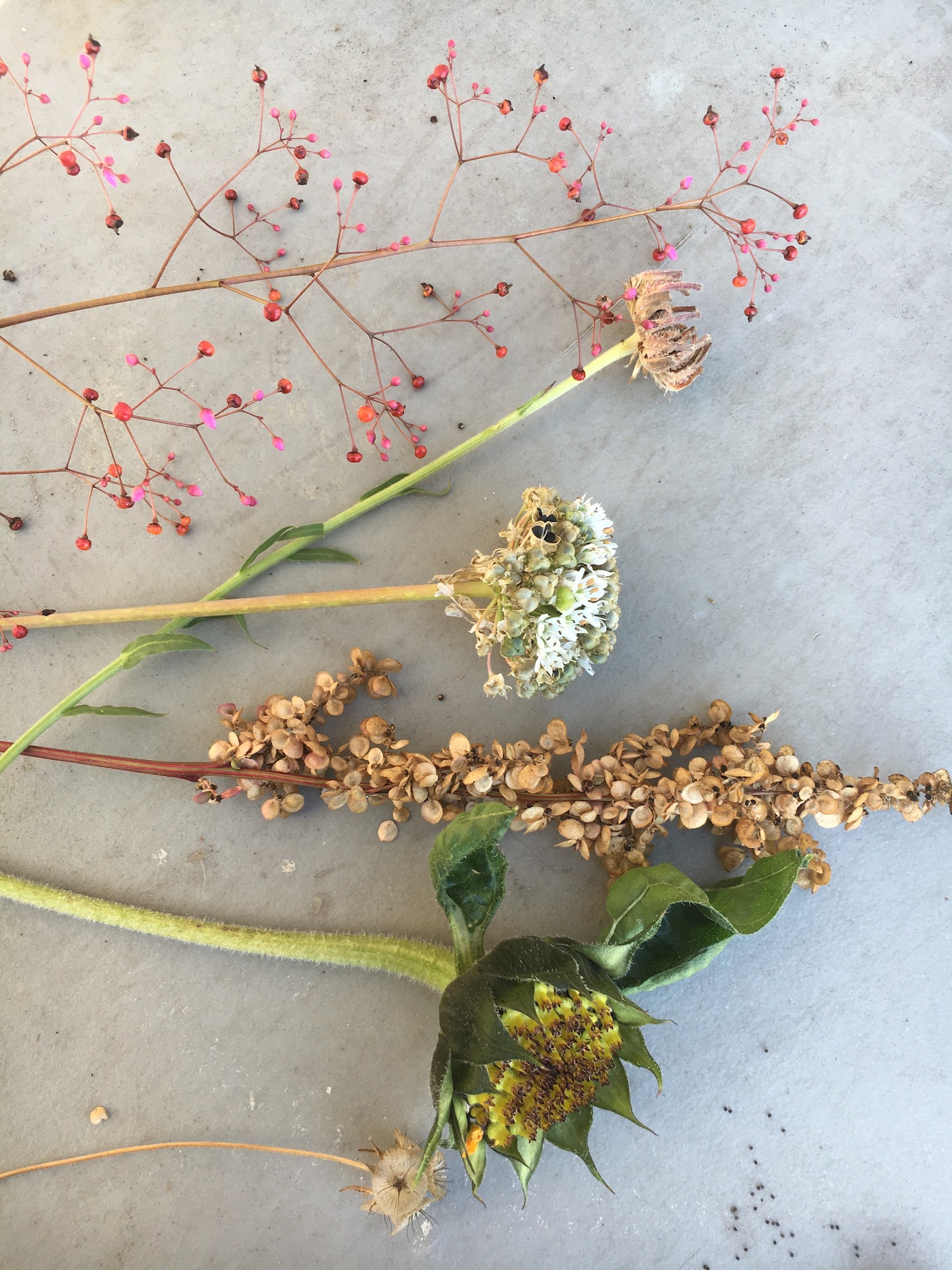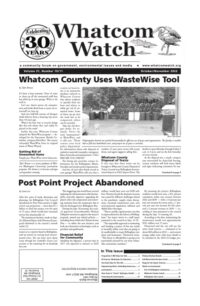by Elisabeth Marshall
Editor’s Note: This is the last column by Elisabeth Marshall in 2022 — her column will resume in late spring 2023.
We have been very well-fed this summer — a neighbor’s delectable corn — generously shared, fresh salmon from the island reef net gears, crab in abundance, island-raised chicken and beef, beautiful raspberries, currants and blackberries, tomatoes, lettuce, squash, spinach, potatoes, garlic, onions, fennel, beans, kale, apples and plums, on and on. We have canned, frozen, dried, and pickled our way to food security for this winter.
Now that we’ve turned the seasonal corner toward fall, we are cleaning gardens and tarping them or planting cover crops to enrich and protect them while they lie fallow. Seed saving is a big part of the process — it is a relaxing and satisfying way to focus closely on plants as they finish their season of fruiting or flowering. It brings us up close to the birds and mammals busily stocking up for their winters, and, of course, the bees, thick on every plant offering nectar and pollen, racing the diminishing day length, lay up the stores that will feed their queen and ensure the hive’s survival this year — they hope.
This summer has been so dry that areas that haven’t been watered and weeded regularly (some of my flower beds around the house) actually shed water now. The earth is rock hard, apparently impervious to moisture. This is a phenomenon I have read about which occurs in drought-stricken places. It is disturbing to see it in one’s own garden. I plan to do a thorough weeding and turning of those beds and add compost, followed by several-inch-thick mulch applications before hoped-for rains come.
Washington State Department of Agriculture
I mentioned in my September column that Full Bloom Farm was applying for a Local Food System Infrastructure Grant from the Washington State Department of Agriculture. We succeeded in our efforts and were awarded a grant to help us improve the infrastructure on our farm that we use to process and distribute the food we grow and source to the local community. WSDA has recently awarded more than $16 million in grants to small farms and food businesses to help them recover from ongoing economic impacts from the Covid-19 pandemic. Legislators designed the grant to improve the strength and resiliency of Washington’s food systems.
Applicants offered proposals in record-breaking numbers, with requests totaling over $148 million dollars — more than nine times the available funding. This, in spite of applicants being given less than a month lead time to write and submit proposals.
Purposes of the Grants
The fundamental purposes of the grants are:
• Rebuilding food supply chains by strengthening the capacity and resilience of post-harvest local food infrastructure,
• Assisting small businesses to recover by improving their ability to aggregate, process, transport, and store Washington-grown foods in Washington, and
• Assisting small agricultural producers to recover by fostering the creation and sale of value-added products in local markets.
According to WSDA, the Covid-19 pandemic disrupted food supply chains and exacerbated longstanding structural challenges for small businesses in the food system. The pandemic disproportionally affected small businesses, including those owned by women and minorities. Recovery and support of small businesses engaged in the local food supply system is essential to building in resiliency and assuring that adequate food supplies are available to protect public health.
The grants will benefit Washington consumers by rebuilding local food supply chains and increasing resiliency through greater local capacity and consumer access to locally produced products.
Panel of Expert Reviewers
A panel of 32 expert reviewers with a wide range of knowledge of the local food, farming, processing, and distribution system considered a project’s ability to create value and improve capacity along the local food supply chain, and provide benefits and opportunity to Washington farms selling products in local markets.
Evaluation included assessment of a project’s achievability within the grant timeframe (i.e. reasonableness of project activities, budget, level of planning, readiness to implement, and experience of the project team).
In an effort to maximize the impact of grants on local food system strength statewide, WSDA followed the review panel’s recommendations to:
• Provide partial funding in order to increase the number of funded projects,
• Prioritize projects with direct economic benefits to farms, and
• Fund a mix of geography, with consideration of particular regional needs.
Whatcom County Grant Recipients
Following is a list of the grant recipients from Whatcom County:
• Full Bloom Farm, Lummi Island — Produce/Marketplace
• Holly’s Meat Pies, Bellingham/Everson — Food Processor
• HOSAco, Bellingham — Food Processor
• Mariposa Farm, Everson — Produce
• Owl Eye Farm, Bellingham — Produce
• Osprey Hill, Acme — Meat
• Pangea Ferments, Bellingham — Food Processor
• Steensma Creamery, Lynden — Dairy
• Sustainable Connections/dba Cloud Mountain Farm, Bellingham — Value-Added
• Ten Mile Meats, Everson — Meat
• Twin Sisters Markets, Bellingham, Deming, Kendall — Marketplace
• Williams Farms, Deming — Produce
• Winding Road Farm, Everson — Produce
Small farms and food businesses make up the majority of Local Food System Infrastructure Grant beneficiaries across the state. Seventy-six grant beneficiaries are entities led by Black, Indigenous, People of Color, and women.
In Whatcom County, all of the grants awarded are in the small project category.
Grant funds were awarded in 34 of Washington’s 39 counties.
Whatcom County received $1,500,750 in grants, second only to Skagit County, statewide!
Local Food System Infrastructure
Grants support investments in various types of local food system infrastructure. These include:
• Equipment for food processing,
• Improvements or additions to food storage,
• Improvements to food processing facilities,
• Vehicles to improve food distribution,
• Food product marketing support, and
• Additional wash/pack facilities to improve food safety and small farm viability.
The number of and monetary value of the grants awarded to Whatcom County farms and food enterprises underlines the rapid growth and development of our local food system. Much to our collective benefit, farmers and food producers are gaining an important foothold in our local economy.
Reimbursement Grants
The work required of the grant recipients is not trivial. The infrastructure grants are reimbursement grants. We will be required to self-finance and finish our project and submit our reimbursable expenses for payment through grant funds by mid-June 2023. This signals a winter of intense planning and budgeting and building to get our project finished in time for the spring planting time ahead. We have already received generous offers of help from friends and neighbors. If you have a grant recipient near you, think about offering to lend a hand to them this winter or spring. It will be time well-spent.
As summer winds into fall, the chicories we planted in July are sizing up nicely. They prosper as the days shorten and nights turn chilly. I include my favorite chicory salad recipe here. You will be able to find fresh, locally grown chicories at the Community Food Co-op and the Farmers Markets all fall and winter, or perhaps, in your own gardens. Use different kinds and colors for the beautiful diversity of flavors, textures and colors they bring to the table: Pan Zucchero, Precoce, Treviso, Chioggia, Variegato di Castelfranco, Variegato di Luisa, Rosa di Veneto and Radicchios and Escaroles.
Winter Chicory Salad
Full Bloom Farm
Fill a salad bowl with well-washed and spun-dried chicory leaves of one variety or of mixed varieties, with or without radicchios and escaroles.
Scatter with pickled red onions (recipe follows).
Add a few small handfuls of toasted nuts, preferably hazelnuts or walnuts.
After dressing the salad, add crumbled bleu cheese or shaved parmesan.
Fennel frond is a nice finishing touch.
Optional additions:
• Sliced apples, skin-on
• Orange sections
• Thinly sliced fennel
• Kalamata olives
• Croutons of whole grain bread
Pickled Red Onions
Slice red onion thin, yielding 1 cup. Put in a bowl and add kosher salt (1-2 tablespoon) and rice vinegar just to cover. Let marinate at room temperature for an hour.
To dress your salad, squeeze the marinating onions gently to drain them of vinegar before scattering them across the salad. Drizzle salad with the marinating vinegar and then good olive oil in a 1 part vinegar/4 parts olive oil ratio +/-. Salt and pepper to taste. Add cheese and nuts and optional fruit/fennel/fronds/olives/croutons and toss gently.
_______________________
Elisabeth Marshall and her family have lived in Whatcom County for 40 years. They grow fruit, vegetables, cut flowers, eggs, sea salt, and peonies on their Full Bloom Farm. They sell their goods at their farm stand, which is open from April through December and at the Lummi Island Farmers Market.





























